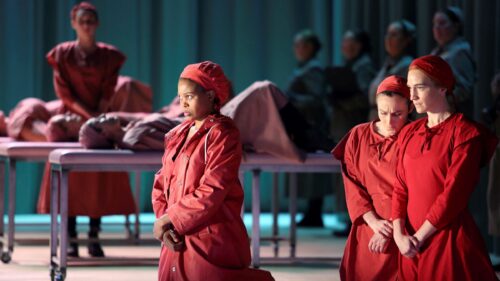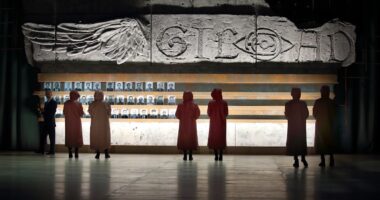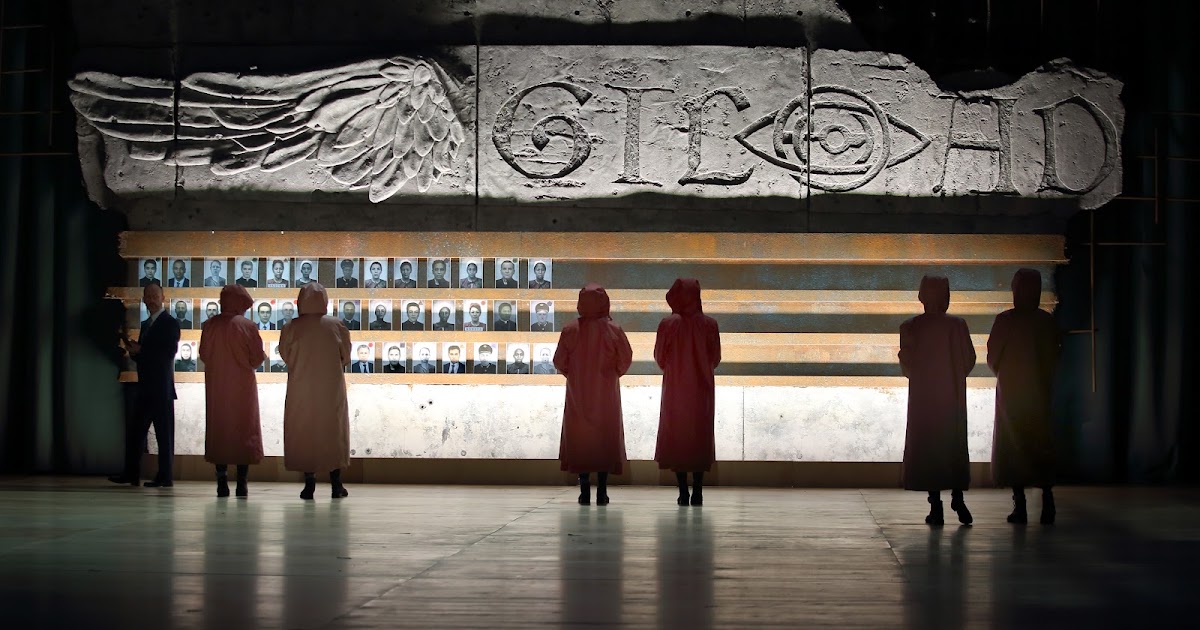 United Kingdom Ruders, The Handmaid’s Tale: Soloists, Chorus and Orchestra of English National Opera / Joana Carneiro (conductor). London Coliseum, 8.4.2022. (CC)
United Kingdom Ruders, The Handmaid’s Tale: Soloists, Chorus and Orchestra of English National Opera / Joana Carneiro (conductor). London Coliseum, 8.4.2022. (CC)

Production:
Director – Annilese Miskimmon
Set and Costume designer – Annemarie Woods
Lighting designer – Paule Constable
Video designer – Akhila Krishnan
Sound designer – Yvonne Gilbert
Movement director and Intimacy coordinator – Imogen Knights
Cast:
Offred, Past & Present — Kate Lindsey
Professor Pieixoto – Camille Cottin
Luke – John Findon
Luke & Offred’s Daughter – Elspeth MacDonald / Francesca Ditchburn
Offred’s Mother – Susan Bickley
Aunt Lydia – Emma Bell
Moira – Pumeza Matshikiza
Janine / Ofwarren – Rhian Lois
Moira’s aunt – Susanna Tudor-Thomas
Serena Joy – Avery Amereau
The Commander – Robert Hayward
Rita – Madeleine Shaw
Nick – Frederick Ballentine
Ofglen – Elin Pritchard
New Ofglen – Annabella-Vesela Ellis
The Doctor – Alan Oke
Warren’s Wife – Lydia Marchione
Commander X – Adam Sullivan
Guard – Ronald Nairne
The premise of Poul Ruders’s The Handmaid’s Tale could be the very definition of the word ‘dystopian’. He sets Margaret Atwood’s astonishing novel of that name, its events set in the future (‘The Handmaid’s Present’), itself framed by a framing conference set in that time’s future (given in the Symposium Prologue as 2195 AD).
Atwood’s seminal book is very much in the public’s consciousness right now, given its use as an A Level text and a ‘hugely successful’ (to quote English National Opera’s infosheet)’ TV series starring Elisabeth Moss. It was also made into a film in 1989, directed by Volker Schlöndorff with screenplay by Harold Pinter, no less, and starring Robert Duvall and Faye Dunaway. Sadly, the soundtrack to the TV series is of significantly lesser import, while Ruders offers a work that at times approaches genius. This is one of the finest of modern operas; its 2003 staging at the London Coliseum, just three years after the world premiere in Copenhagen, was itself a major event. Now we have a completely new production by Annilese Miskimmon, ENO’s director and artistic director, who leads a completely female creative team.
The themes of male-led oppression, of a totalitarian theocracy and evil actions that instead of having repercussions are part of the accepted fabric of society seems all too relevant today. The interplay between control versus freedom is writ large in this opera, where sex becomes an act shorn of love. President and congress have been shot, and martial law rules. Women who can bear children have to, due to the effects of various disasters, natural and man-made; and they have them for the members of a privileged higher class that cannot (the Bible is used to defend this, Genesis 30:3, ‘And she said, Behold my maid Bilhah, go in unto her; and she shall bear upon my knees, that I may also have children by her’). The scene of sexual intercourse found the ‘barren’ lady of the privileged class immediately behind the Handmaid, with the man penetrating the Handmaid; never could there be a sexual act comprising three people that could be less of a ‘threesome’. Handmaids are not allowed to read, to hold money; and their names reflect who they are in possession of (‘Of Fred’); those that refused the childbearing task become ‘Unwomen’ and were either publicly hanged or sent to the ‘Colonies’.
Miskimmon uses the vast space of ENO’s stage to great effect. A space that needs to be filled, and frequently isn’t, like the void in the souls of the inhabitants of the society of Gilead; a place in which survival and courage play a great part for the heroine, Offred (pronounced here with an emphasis on the two words – Of-Fred, while in the Dacapo recording it is closer to an elided ‘Offred’). By offering a staging in which space and its emptiness is vital, one feels that the attempts to ‘fill’ that space are somehow as insubstantial as the fenced off emotions of Gilead. Lighting pays a vital part in this, and Paule Constable’s contribution is a major aspect of the success of this production. Miskimmon offers a ‘Wall’ that shows photos of dead Handmaidens (as opposed to hanging bodies). There is no doubt she has clearly absorbed into her blood Paul Bentley’s libretto.

Akhila Krishnan’s videos allow for brilliant use of flashbacks to the ‘time before’ (Act I, Scene 12, for example, the birth of Janine’s baby).
Musically, Ruders’s score is magnificent. His kaleidoscopic scoring is met by his magpie use of musics, all knitted together beautifully. The haunting ‘Amazing Grace” acts as something of a thread through the gargantuan score, its shape and sound skewed as if through a fairground mirror. Whatever the mode of delivery, Ruders consistently projects an undercurrent of disquiet; this is a society wounded at core level. There are moments that are decidedly minimalistic, others hymnic, others reference plainchant, others even bring in music hall (Act 1, Scene 8), much that is modernistic in a disjunct, angular, dissonant way. Ruders plays with not just levels of dissonance per se but also how it functions at differing dynamic levels: the use of dissonance in tender duet is notable. There is also a decidedly ritualistic aspect to Ruders’s music, which seems to reflect the sense of distancing from emotions that is at the core of Gilead (as is the use of the collective, from the uniform clothing to the murders of their own).
American mezzo Kate Lindsey triumphs as Offred, the heroine, in what is both a role and ENO debut for her. The loveliness of her voice is put to the full service of Ruders’s writing; she has completely absorbed the part, and lives Offred’s suffering viscerally. It must also be a massively taxing part, and Lindsey never once shows any sense of strain or flagging. Emma Bell sings Aunt Lydia, offering a spectacular vocal display in the high-lying tones, while Avery Amereau, in an ENO debut sings Serena Joy with the utmost warmth. Rhian Lois, a former ENO Harewood Artist, triumphs as Janine/Ofwarren, while Pumeza Matshikiza (Fox in the ENO’s recent The Cunning Little Vixen) continues her ascent up the ladder of significant singers of today. Her voice is stunning; as is Elin Pritchard’s as Ofglen, Offred’s ‘shopping partner’. Wonderful to see Susan Bickley in this phenomenal cast, as Offred’s mother, commanding the stage as always. And a treat to have Camille Cottin (known for the wonderful French Netflix comedy series Call My Agent! as well as her current part in the BBC’s Killing Eve). As the Professor in the framing segments, she leads us into the events of Gilead and then, at the end, reflects on fate. Cottin takes the part with the utmost command and confidence.
Quite fitting that the female roles were considered first, of course. The Commander is taken by the renowned Robert Hayward, another singer of great stage presence and it is testament to his success that we revile his actions on stage; Frederick Ballantine is a fine tenor who takes on Nick, the chauffeur, while Jon Sindon similarly impresses as Luke.
A brilliant production of a major opera. The orchestra is on cracking form under Joana Carneiro, who specialises in contemporary works. Good to see it with a full audience on this occasion, although redistributed tickets from Covid-cancelled performances must surely have helped. Grab any remaining tickets while you can so not to miss it.
Colin Clarke
